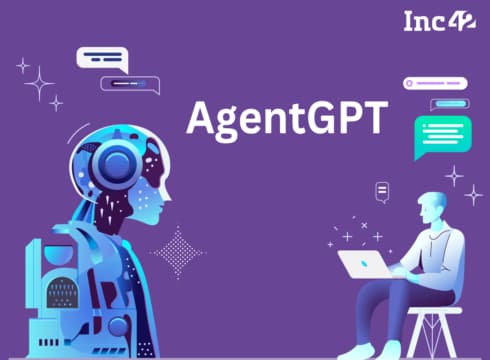Currently in its beta stage, AgentGPT evaluates sub-actions and completes tasks accordingly to effectively answer the queries of its users
AgentGPT’s primary competitor appears to be Auto-GPT, which, more or less, offers similar functionalities. The only edge AgentGPT has over Auto-GPT is its user-friendly web-based interface
Just like Auto-GPT, AgentGPT suffers from issues such as high processing costs and frequent instances of getting stuck in a loop while solving a given problem.
Inc42 Daily Brief
Stay Ahead With Daily News & Analysis on India’s Tech & Startup Economy
After OpenAI unleashed its chatbot, ChatGPT, upon the world in November 2022, all hell broke loose as many feared AI taking over their livelihood. While many termed the development as ‘pathbreaking’, others believed that the world would never be the same again.
Five months on, it seems that even ChatGPT is passé. Bringing about the realisation has been the ‘sparks’ of artificial general intelligence (AGI) shown by OpenAI’s newest large language model (LLM) called GPT-4, which, as per Microsoft’s researchers, was not supposed to happen for at least the next 2 decades.
AGI simply refers to AI models that can perform tasks autonomously to realise objectives without any human intervention.
While autonomous agents such as Auto-GPT (launched last month) and BabyAGI gained the spotlight for their autonomous nature, it is pertinent to note they were backed by the newer GPT-4 version.
Auto-GPT is an open-source platform, built on GPT-3.5 and GPT-4, which automates multi-step projects without any human intervention.
While the world was still in awe of the new tech, developers Srijan Subedi, Asim Shrestha and Adam Watkins released a GPT-based model called AgentGPT earlier this month. The announcement saw rapid adoption by users online and opened to rave reviews.
Simply put, AgentGPT allows users to deploy autonomous AI agents for multiple tasks. Users can type in the agent’s name and then direct it to perform a specific task. It will break the solution into multiple chunks and build a solution for the problem.
But what sets it apart from Auto-GPT is that the newest entrant in the AI arena does not require any installation and is easily available for access through a web browser. While the first version of the AgentGPT was based on GPT-3, its second avatar also has GPT-4 support upon users entering their respective API keys.
The Architectural Core Of AgentGPT
Currently in its beta stage, AgentGPT has been built using Next.js on Ping.gg stack. Leveraging large language models, the platform generates task lists and then executes them iteratively. Alongside, it evaluates sub-actions and completes tasks to solve the question posed by a user effectively.
One of the biggest points favouring AgentGPT is that users have the option of running the platform directly from the confines of their browser and do not need to understand coding to operate the model.
Based on GPT-4 and GPT-3 LLM, AgentGPT allows viewers to save and share the agent with others and enables users to export their agent results to various formats such as PDFs, images or text.
While AgentGPT’s architecture allows it to deploy LLMs, the developers of the platform are also working on incorporating features such as local and long-term memory storage, which will likely improve context preservation and subsequent decision-making. They are also working on functionalities such as web browsing and user authentication.
Functionalities Of AgentGPT
AgentGPT could largely see its deployment in a slew of industries and across multiple use cases. The platform could see specific deployment among enterprises which are looking to gather information in one place and automate their business process. The platform also has the potential to streamline startup operations and enable them to save time that would otherwise be spent on collating data.
It could also see usage in processes to automate domains such as copywriting, generate use cases and optimise business operations with just a little human effort.
AgentGPT could also be used as a personal assistant and in areas like data analytics, automation and customer service.
AgentGPT Vs Auto-GPT: Who’s To Win
AgentGPT’s primary competitor appears to be Auto-GPT, which, more or less, offers similar functionalities. The only edge AgentGPT has over Auto-GPT is its user-friendly web-based interface.
While the new agent appears to perform tasks based on user input merely, Auto-GPT is formulated to work autonomously to achieve ‘specific goals’ without constant human intervention.
Another differentiating factor appears to be memory, which comes embedded in Auto-GPT. The same is a work in progress for AgentGPT.
Pre-trained in OpenAI’s LLM, Auto-GPT is focussed on text generation while AgentGPT primarily revolves around task execution. AgentGPT claims to be able to adapt to newer scenarios more quickly and claims to be easily integrable with a wider range of applications.
While no such studies have been done, the two players could easily be pitted against each other in key operational metrics such as response time, accuracy and throughput.
While accessibility is an issue in Auto-GPT, it has a more advanced system and largely caters to developers with sufficient knowledge of coding. However, just like Auto-GPT, AgentGPT suffers from issues such as high processing costs and frequent instances of getting stuck in a loop while solving a given problem.
The new agent joins a slew of new offerings that the AI space has churned out in the past few months. In what is emblematic of the ongoing disruption in the AI space, it remains to be seen how well AgentGPT holds its ground amid a volley of new launches and products in the burgeoning domain.
{{#name}}{{name}}{{/name}}{{^name}}-{{/name}}
{{#description}}{{description}}...{{/description}}{{^description}}-{{/description}}
Note: We at Inc42 take our ethics very seriously. More information about it can be found here.


